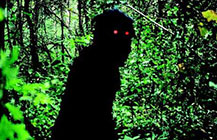|
|
|
|
Uncle Boonmee Who Can Recall His Past Lives
|
 |
|
Apichatpong
Weerasethakul made an extraordinary career breakthough at the Cannes Film
Festival of 2010, winning the Palme d’Or for Uncle Boonmee Who Can Recall His Past Lives. He was not quite 40
years old. Yet his movie carried so much weight beyond its fragile, trembling
self: not only did it represent the victory, at last, of a certain, supposedly
difficult type of cinema on the world stage; it was also seen as the
culmination of an already full and amazing career in film, video and art.
Uncle Boonmee has the
power to charm even those who are resistant to its mysteries: the animal-men
with bright red eyes; an energetically horny fish who penetrates a woman; the
plot that goes off on long, unannounced detours; a section narrated entirely in
still photos; and the floating ambiguity concerning exactly which people and
things relate to those past lives of the title character.
In
truth, we must learn to simply groove along with the flow of Apichatpong’s
style of cinema. It is an indiscernible, florid hybrid of Eastern and Western,
ancient and modern influences. There is no single character on-screen who can
serve as our infallible guide to this world of sounds and visions; we must get
lost in it, as a sensual, cultural, intellectual adventure.
Apichatpong
is the most distinctive pantheist of contemporary cinema. Life is not only a
gift in his work, but also something holy, trembling with intimations of the
divine – a reflection, in part, of the director’s deeply held Buddhism. The
spirits of the deceased are everywhere in his films, inflecting and influencing
the course of earthly events. And those earthly events themselves tend to
follow a magic logic: stories break off, repeat, start over, loop around,
forming a striking pattern.
It
is not so much the fictional characters – as touching as they are, and as real
as Apichatpong renders their concrete presence in his use of non-professional
performers – that determines this pattern of life and history. Rather, it is
nature, always beaming, breathing and pulsating at the heart of his oeuvre,
that takes on this overarching, driving role.
Yet
nature, simultaneously, is never divorced from architecture, machinery, culture
and ideas. Ultimately, it is the invention of cinema itself – the fusion of
technological tools with plain reality and staged fantasy alike – that signals
the birth of a New World for Apichatpong. And I cannot
imagine a more gracious and playful host presiding over our entrée into this
world.
MORE Weerasethakul: Syndromes and a Century © Adrian Martin July 2015 |
![]()